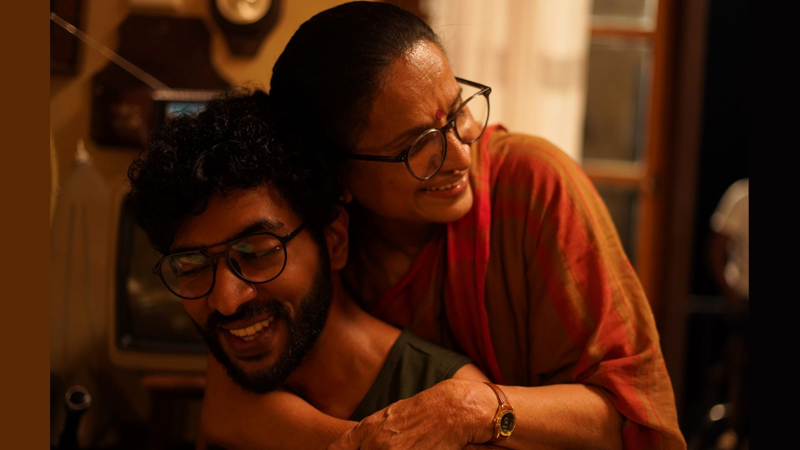 As Isabel Allende once said, “You can tell the deepest truths with the lies of fiction.” The latest feature film by Asoka Handagama, ‘Rani,’ presents a fictional story of Richard de Zoysa through the eyes of Manorani revealing bold truths that highlight the absurdity of reality. It explores how Manorani’s emotional decisions challenge traditional male-centric logic and how illogical events intertwine to obscure darker truths related to human subjectivity.
As Isabel Allende once said, “You can tell the deepest truths with the lies of fiction.” The latest feature film by Asoka Handagama, ‘Rani,’ presents a fictional story of Richard de Zoysa through the eyes of Manorani revealing bold truths that highlight the absurdity of reality. It explores how Manorani’s emotional decisions challenge traditional male-centric logic and how illogical events intertwine to obscure darker truths related to human subjectivity.
In the film ‘Rani’, we meet Manorani, an upper-middle-class gynaecologist and single mother who lives a carefree, independent life with her beloved son, Richard. Oblivious to the political turmoil unfolding around her in the country, Manorani’s self-absorbed nature is starkly highlighted in a chilling scene where, while driving with Richard, she witnesses his friend Gayan being abducted. Despite the urgency of the situation, Manorani hesitates to speak up, fearing for Richard’s safety if he gets involved.
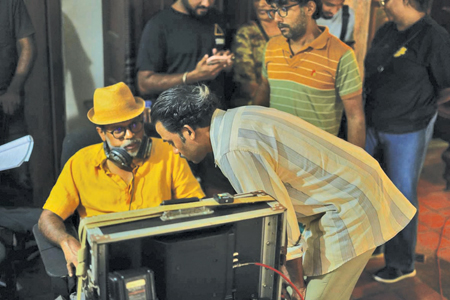 Tragedy strikes when Richard is brutally killed, serving as the catalyst that pushes Manorani into the political arena. Her friend Mangala, alongside the influential Mahinda encourages her to take a leadership role in the ‘Mothers’ Front’, an increasingly powerful movement aiming to challenge the prevailing political powers.
Tragedy strikes when Richard is brutally killed, serving as the catalyst that pushes Manorani into the political arena. Her friend Mangala, alongside the influential Mahinda encourages her to take a leadership role in the ‘Mothers’ Front’, an increasingly powerful movement aiming to challenge the prevailing political powers.
‘Mothers’ Front’
Initially, she refuses to participate due to anonymous death threats she receives in the form of letters, prompting her to flee the country. However, she returns and decides to form the ‘Mothers’ Front’ in the South, which brings new purpose to her life. While some may argue that her personal grief has been co-opted by opportunistic politics, for Manorani, this activism emerges as a necessary outlet for her anguish and loneliness following the loss of her son.
The film presents two compelling premises. The first premise delves into female subjectivity, showcasing the power of feminine emotion and how Manorani’s life and decisions are driven by her feelings, often eluding the rigid, logical frameworks typically found in male-centric narratives.
The second premise reflects the absurdity of reality, highlighting how, beyond logical explanation, events intersect in a perverse dance that often disguise the darker aspects of enjoyment in relation to human subjectivity.
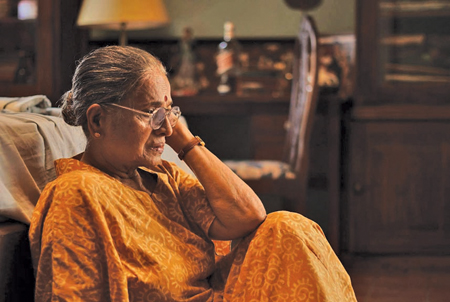 In the film’s final scene, a group of drunken political henchmen, returning from a raucous celebration, idly discuss their boss’s concerns, mentioning Richard de Zoysa, a journalist whose fearless reporting exposes the Government repression of youth insurgency.
In the film’s final scene, a group of drunken political henchmen, returning from a raucous celebration, idly discuss their boss’s concerns, mentioning Richard de Zoysa, a journalist whose fearless reporting exposes the Government repression of youth insurgency.
Their conversation takes a grotesque turn, as they make crude jokes about Richard’s sexual orientation, embarking on a detour to his home. It’s a chilling reminder of how easily laughter can mask the darkness of violent intent, culminating in the harrowing end of Richard’s life and leaving audiences with lingering questions about justice, grief and the absurdity of power, issues that demand logical explanations.
In an interview with Asoka Handagama, just days before the press showing of ‘Rani,’ he explained the reasons behind his choice to make another film after ‘Alborada’, which was based on true events from the past.
This marked the first time in Handagama’s cinematic career that a producer with a comfortable budget approached him to create a film based on their desired theme. It had long been Swarna Mallawarachchi’s dream to bring to life the character Dr. Manorani Saravanamuttu. She had deliberately sought to portray Dr. Manorani and had spent years pitching the project to various directors and producers. However, it was only last year that this proposal came to Handagama. “As a person who has been going through strenuous physical challenges health-wise, this project brought so much light into my life.” Handagama added.
Journalist and newsreader
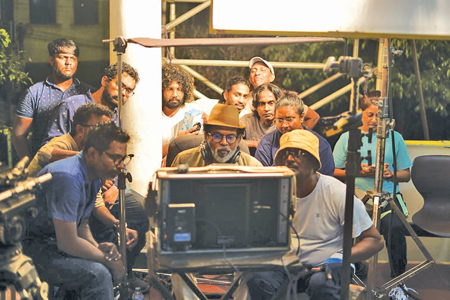 Handagama said that “the film ‘Alborada’ was based on a small incident mentioned by Neruda, which is fictional history; at that time, we were not alive. But the protagonist of the film ‘Rani,’ Richard De Zoysa, was someone everyone knows. We all lived during the days when Richard was alive, when he was a famous journalist and newsreader.
Handagama said that “the film ‘Alborada’ was based on a small incident mentioned by Neruda, which is fictional history; at that time, we were not alive. But the protagonist of the film ‘Rani,’ Richard De Zoysa, was someone everyone knows. We all lived during the days when Richard was alive, when he was a famous journalist and newsreader.
There are still individuals associated with Richard and his mother, Dr. Manorani Saravanamuttu, while some relatives are still alive. Moreover, people were aware of Manorani’s involvement with the Mother’s Front in 1990. The killing of Richard de Zoysa along with related court cases and Manorani’s activism are all details readily available on the internet. Therefore, it becomes critical and tricky to create a film based on such a story, as viewers can easily become distracted by the real incidents intertwined with the fiction. “When penning ‘Rani,’ I wrote it through the eyes of Manorani. Therefore, as spectators, you see Manorani’s Richard.”
Handagama added. “I never met Richard de Zoysa in my life. However, there was a friend of mine named Gayan and he had a somewhat close relationship with Richard during my boarding-university days at that time. This was in the late 1980s. He could speak good English at that time and was part of the university students’ union, working closely with Richard. Through Richard, he communicated all the suppression that the youth faced in their uprising against the Government; unfortunately, he was killed before Richard.
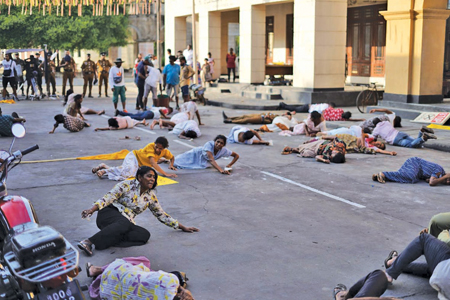 That is the character I brought into the film as Richard’s friend. I also knew for a fact that Richard was there at the premiere of my theatre production ‘Maghatha.’ Those are the true elements I have about Richard from my firsthand experiences, and I took them into the film,” As Handagama says the film is mostly about Manorani and many of her personal stories and relationships were recreated in the film. When researching her character, Handagama didn’t take any references from her family, as it could be biased. “However, during the editing process, I got to know that the Saravanamuttu family was a bit worried about the film and therefore I invited them to come and see it. They have been very modest and liberal in their thinking, so they never had an issue with how the film turned out”, Handagama said.
That is the character I brought into the film as Richard’s friend. I also knew for a fact that Richard was there at the premiere of my theatre production ‘Maghatha.’ Those are the true elements I have about Richard from my firsthand experiences, and I took them into the film,” As Handagama says the film is mostly about Manorani and many of her personal stories and relationships were recreated in the film. When researching her character, Handagama didn’t take any references from her family, as it could be biased. “However, during the editing process, I got to know that the Saravanamuttu family was a bit worried about the film and therefore I invited them to come and see it. They have been very modest and liberal in their thinking, so they never had an issue with how the film turned out”, Handagama said.
“I never wanted to make Manorani a heroic character. Instead, I wanted to reveal how her emotions have been manipulated in male-centric political propaganda. Kumuduni Saravanamuttu, one of Manorani’s relatives was at the Central Bank when I was working there. They were very easy-going, happy-go-lucky people that I know and it is surprising to imagine Manorani as a political activist. However, it is a known fact that she was a kind woman who helped the poor. The killing of Richard pushed her to take the decision to get involved with political activism”, he added.
“Editing is my joy”
As a filmmaker who has been involved in cinema for decades and never gets tired or deviated from his mission of making films under any circumstance, it’s intriguing to know what keeps him passionate about the filmmaking process. Some filmmakers enjoy writing and creating a perfect script, some love shooting and directing while some others relish collaborating with the film cast and crew. As for Handagama, it’s editing. “I love editing the most in my creative process,” he said. “It gives me the chance to create what really was there in my head at the time I imagined when I was writing”, he added.
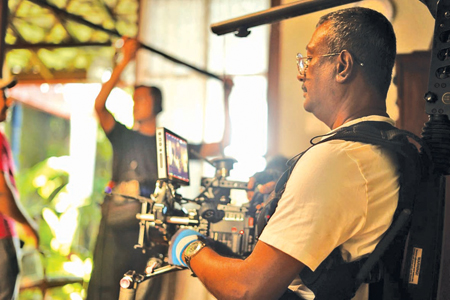 Handagama said that in the project ‘Rani,’ he tried a different form of filmmaking that he had never attempted before. This project came together very quickly, leaving him with a short time frame from pitching to shooting. At that point, the shooting and film release dates were already set, although they were later postponed due to the elections. To manage the tight schedule, he diversified the research and scriptwriting responsibilities among a team that provided him with information, dialogue and insight into incidents that had genuinely occurred during that time. “I compiled and wrote the script and this practice is a little different from my usual approach to making films and I’m happy I tried this as it brought a different mood to the whole thing.” he said.
Handagama said that in the project ‘Rani,’ he tried a different form of filmmaking that he had never attempted before. This project came together very quickly, leaving him with a short time frame from pitching to shooting. At that point, the shooting and film release dates were already set, although they were later postponed due to the elections. To manage the tight schedule, he diversified the research and scriptwriting responsibilities among a team that provided him with information, dialogue and insight into incidents that had genuinely occurred during that time. “I compiled and wrote the script and this practice is a little different from my usual approach to making films and I’m happy I tried this as it brought a different mood to the whole thing.” he said.
“Making films is my life”
Handagama’s filmmaking is known for minimal directing on set. He said, “I imagined each scene during the pre-production stage with the cinematographer and the art director and discussed it with the cast, allowing them to grow in the scene while capturing it.”
His films are often characterised by a distinct cinematic imagery and abstract dialogue style, however, in his recent works, this unique Handagama style was missing. “It was a deliberate shift as I wanted to capture contemporary themes in cinema and that shift could be visible from ‘Asandhimitra.’” he acknowledged.
Concluding this fascinating cinema conversation, when asked why he does what he does in this art form, Handagama simply said, “Making films is my life. My ultimate desire that keeps me breathing. Making films holds the breath of my life.”
Screened islandwide from January 30
‘Rani’ is written and directed by Asoka Handagama and produced by Lyca Lanka Productions. The production team includes Head of Productions Janaki Wijerathne, Executive Producers Trilan Shastri Ganeshan and Nayomi Apsara and Showrunner turned Associate Producer Uditha Kahandawaarachchi. The film features Channa Deshapriya as the Director of Photography, Ravindra Guruge as the editor and music directed by Rohana Weerasinghe.
The production designer is Bimal Dushmantha, with hair and make-up by Priyantha Dissanayake and costume design by Piyathissa Akuramboda. The main cast includes Swarna Mallawarachchi as Manorani, Sanath Gunathilaka as Lalith, Mayura Kanchana as Karu, Rithika Kodituwakku as a young lady, Rehan Amarathunga as Richard, Sajitha Anuththara as Gayan, Bimal Jayakodi as Mahinda and Ashan Dias as Mangala.
‘Rani’ will be screened islandwide at EAP cinemas starting January 30.



